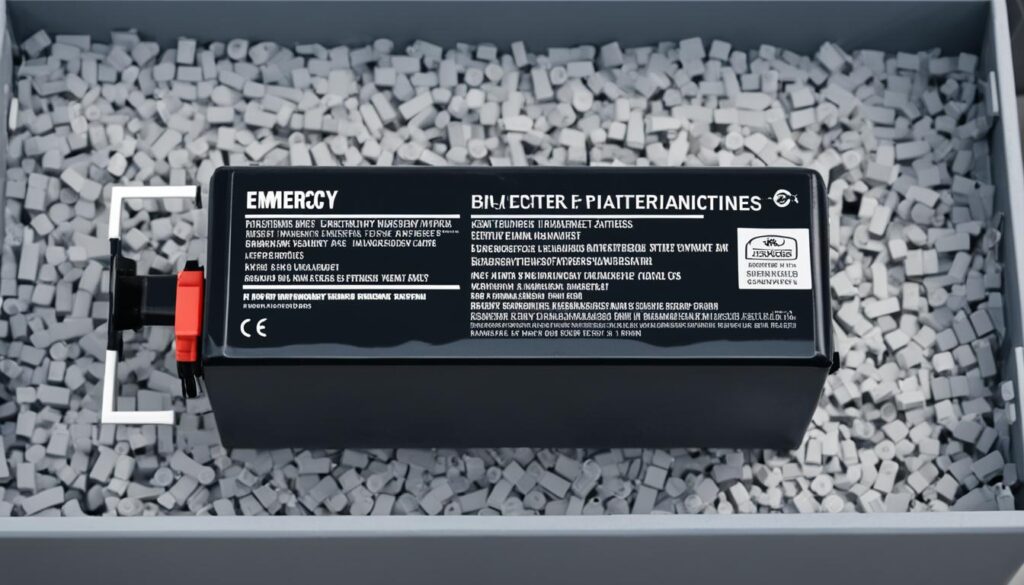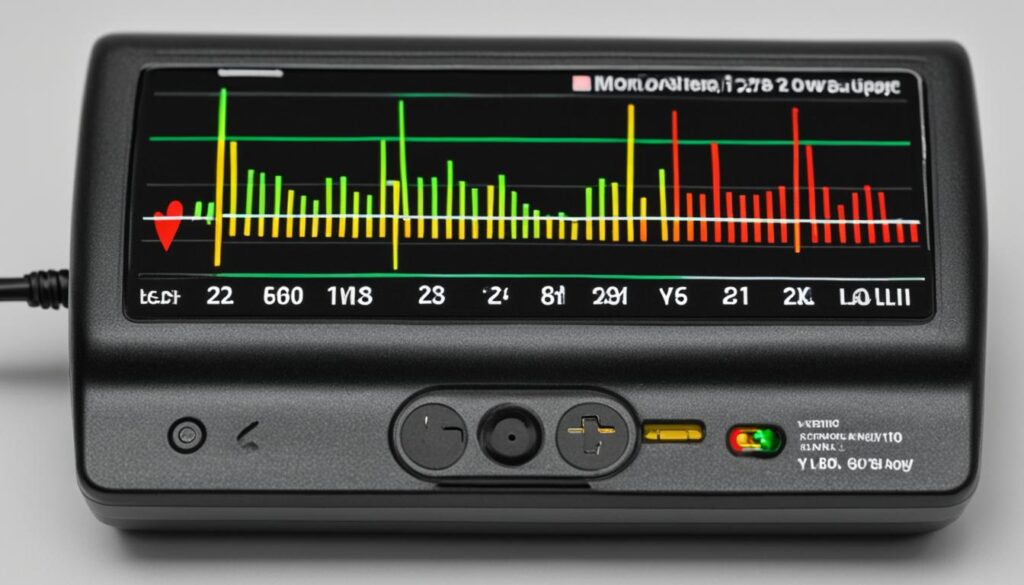
Proper storage and maintenance of emergency batteries are crucial for ensuring their longevity and reliability when you need them the most. Whether it’s for power backup during a blackout or for use in emergency devices, following these battery care tips will help you get the most out of your batteries.
First and foremost, it is important to store your emergency batteries in a cool, dry place. Extreme temperatures can have a detrimental effect on battery performance and overall lifespan. Therefore, avoid storing them in areas prone to high heat or freezing temperatures.
Additionally, make sure to keep your batteries away from direct sunlight or sources of moisture. Exposure to these elements can lead to corrosion and damage. A closed container or a dedicated battery storage case can provide an extra layer of protection.
When it comes to maintenance, it’s essential to avoid unnecessary power drain. Leaving batteries in devices that are not in use can gradually drain their capacity. Remove batteries from devices when not in use for extended periods to prevent this power loss.
Furthermore, make sure to charge your batteries only when necessary and follow the recommended charging levels. Overcharging or undercharging can adversely affect battery performance and lifespan. Consult the battery manufacturer’s guidelines for specific instructions on charging.
Lastly, paying attention to battery ratings is crucial for proper usage. Each battery type has specific requirements and limitations. Exceeding these ratings can diminish battery life and compromise safety. Always refer to the manufacturer’s instructions for the correct usage and compatibility.
Key Takeaways:
- Store your emergency batteries in a cool, dry place to prevent damage.
- Avoid exposing batteries to direct sunlight, moisture, or extreme temperatures.
- Remove batteries from devices when not in use for extended periods to avoid power drain.
- Charge batteries only when necessary and follow recommended charging levels.
- Pay attention to battery ratings to ensure proper usage and compatibility.
Importance of Proper Battery Storage
Proper battery storage plays a vital role in ensuring the longevity and performance of your emergency batteries. By following best practices for battery storage, you can maximize their lifespan and maintain their optimal functionality.
One of the key factors to consider when storing batteries is temperature control. Extreme temperatures, both hot and cold, can have adverse effects on battery capacity and overall performance. It is recommended to store batteries in a cool, dry place, ideally between 41°F (5°C) and 77°F (25°C). This temperature range helps prevent capacity loss and reduces the risk of damage to the batteries.
Additionally, it is crucial to avoid exposing batteries to extreme conditions such as direct sunlight, humidity, or moisture. These factors can accelerate the degradation process and significantly reduce the battery’s lifespan. By protecting batteries from these environmental risks, you can ensure they remain in optimal condition for longer.

Another important aspect of battery storage is adhering to recommended charging levels. Overcharging or undercharging can impact a battery’s health and overall longevity. It is advisable to follow the manufacturer’s guidelines for charging and discharging levels. This helps prevent overtaxing the battery and preserves its capacity over time.
“Proper storage plays a crucial role in extending the lifespan and maintaining the performance of emergency batteries. Temperature control, avoidance of extreme conditions, and following recommended charging levels are key best practices to ensure optimal battery storage.”
– Battery Expert
By implementing these best practices for battery storage, you can ensure the longevity and reliability of your emergency batteries. Remember to store them in a suitable environment, protect them from extreme conditions, and adhere to recommended charging levels. These practices will help maximize the lifespan of your batteries and ensure they are always ready to power your critical devices when needed.
| Battery Storage Best Practices | Benefits |
|---|---|
| Store batteries in a cool, dry place | Prevents capacity loss and damage |
| Avoid exposure to extreme conditions | Preserves battery lifespan |
| Follow recommended charging levels | Maintains overall battery health |
Battery Maintenance Tips
Regular maintenance is crucial for prolonging the lifespan of your emergency batteries. By following these battery maintenance tips, you can ensure that your batteries remain reliable and perform optimally when you need them the most.
- Avoid unnecessary power drain: Minimize power drain by disconnecting devices or equipment from the battery when not in use. Unplugging unused chargers or devices can prevent them from drawing power and draining the battery unnecessarily.
- Charge batteries only when necessary: Overcharging can reduce the overall lifespan of your batteries. To prevent this, only charge your batteries when they are significantly depleted or when you anticipate an emergency situation.
- Charge batteries at the proper temperature: Extreme temperatures can affect battery performance and longevity. Ensure that you charge your batteries in environments with temperatures recommended by the manufacturer. Avoid charging them in excessively hot or cold conditions.
- Pay attention to battery ratings: Each battery has specific ratings, such as voltage and current specifications. It is essential to understand these ratings and use the batteries accordingly. Using batteries with incorrect ratings can lead to improper functioning and potentially shorten their lifespan.
By implementing these battery maintenance practices, you can extend the life of your emergency batteries and maximize their performance. Remember that proper maintenance is the key to ensuring that your batteries are always ready to power your essential devices during critical situations.
| Battery Maintenance Tips | Benefits |
|---|---|
| Avoid unnecessary power drain | Prevents battery depletion and extends overall lifespan |
| Charge batteries only when necessary | Prevents overcharging and reduces wear on the battery |
| Charge batteries at the proper temperature | Preserves battery performance and prevents damage |
| Pay attention to battery ratings | Ensures correct usage and prevents potential damage |

Factors Affecting Battery Lifespan
When it comes to the lifespan of emergency batteries, several factors come into play. Understanding these factors is crucial for maximizing the performance and longevity of your batteries. Let’s explore some of the key factors that can affect the lifespan of your batteries:
Battery Chemistry
The chemistry of the battery plays a significant role in determining its lifespan. Different battery chemistries have varying characteristics and performance levels. Some chemistries may have a longer lifespan, while others may deteriorate more quickly over time. It is essential to choose the right battery chemistry based on your specific needs and usage requirements.
Charging Methods
The way you charge your batteries can also impact their lifespan. Using the recommended charging methods and appropriate chargers designed for your specific battery type can help maintain its overall health. Avoid overcharging or undercharging, as these practices can negatively affect battery performance and reduce its lifespan.
Operating Temperature
The temperature at which batteries operate plays a crucial role in their lifespan. Extreme temperatures, whether too high or too low, can cause damage to the battery cells and significantly reduce their performance and overall lifespan. It is essential to store and operate your batteries within the recommended temperature range for optimal performance and longevity.
Battery Maintenance
Proper battery maintenance is vital for maximizing their lifespan. Regularly inspecting batteries for any signs of damage or wear, cleaning terminals, and ensuring proper storage conditions can significantly impact their performance and longevity. Following the manufacturer’s guidelines for battery maintenance can help ensure that your batteries are in optimal condition when you need them most.

By considering these factors and taking appropriate measures, you can extend the lifespan of your emergency batteries and ensure they perform reliably when needed. Implementing good battery management practices will not only maximize their performance but also save you time and money in the long run.
Methods to Extend Battery Lifespan
When it comes to maximizing the lifespan of your emergency batteries, there are several effective methods you can employ. By implementing these strategies, you can not only extend battery lifespan but also ensure optimal performance when the need arises.
First and foremost, proper usage and charging habits play a crucial role in battery maintenance. Avoid overcharging your batteries, as this can lead to capacity loss and reduced overall longevity. Similarly, discharging your batteries completely before recharging them can help prevent memory effect and extend their lifespan.
Temperature and environmental management also play a vital part in preserving battery health. Extreme temperatures, both hot and cold, can negatively impact battery performance and longevity. Therefore, it is important to store and use your emergency batteries within the recommended temperature range, typically between 32°F and 77°F (0°C and 25°C).
Regular charge and discharge cycles are another effective method to extend battery lifespan. Aim to use your emergency batteries regularly and avoid leaving them unused for long periods. Regularly cycling your batteries helps maintain their internal chemical structure and prevents capacity loss.
Lastly, consistent battery maintenance is essential for prolonging battery life. This includes keeping the battery terminals clean and free from corrosion, as it can impede proper electrical conductivity. Additionally, following the manufacturer’s guidelines for battery maintenance and periodic checks can help identify any issues early on and prevent potential damage.
By implementing these methods and best practices, you can maximize the lifespan of your emergency batteries, ensuring they are always ready to provide reliable power when you need them most.
FAQ
How can I maximize the lifespan of my emergency batteries?
To maximize the lifespan of your emergency batteries, it’s important to store them properly and maintain them regularly. By following recommended storage and charging practices, you can ensure that your batteries remain reliable when you need them most.
Why is proper battery storage important?
Proper battery storage is important to preserve the lifespan of your batteries. By storing them in the right environment, controlling the temperature, and avoiding extreme conditions, you can prevent capacity loss and potential damage to the batteries.
What are some battery maintenance tips?
Some battery maintenance tips include avoiding unnecessary power drain, charging batteries only when necessary, and charging them at the proper temperature. It’s also important to pay attention to the battery ratings and use them correctly.
What factors can impact the lifespan of emergency batteries?
Several factors can impact the lifespan of emergency batteries, including the battery’s chemistry, charging methods, operating temperature, and overall battery maintenance. Understanding these factors is crucial for maximizing battery lifespan.
How can I extend the lifespan of my emergency batteries?
There are various methods to extend the lifespan of emergency batteries, such as using proper usage and charging habits, managing temperature and environmental conditions, regular charge and discharge cycles, and performing regular battery maintenance.


